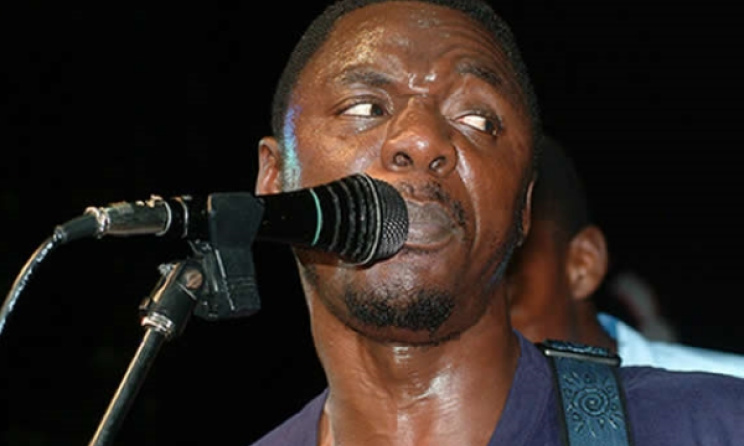Music and its influence in Zimbabwe
Zimbabwean music has played an important part in the country's cultural history and it continues to shape social discourse in the everyday lives of Zimbabweans. Over the years, musical compositions of different genres have provided entertainment, education and social commentary in many aspects in the country. The role of music has even become more important in recent time as artists have become a mouthpiece of the masses in the face of economic and political challenges.
 Thomas Mapfumo. Photo: www.nehandaradio.com
Thomas Mapfumo. Photo: www.nehandaradio.com Mechanic Manyeruke is one of the pioneers of gospel music in Zimbabwe
Mechanic Manyeruke is one of the pioneers of gospel music in Zimbabwe Alick Macheso. Photo: www.bulawayo24.com
Alick Macheso. Photo: www.bulawayo24.com
Music during the war
Before Zimbabwe’s independence from British colonialism in 1980, music played a crucial role in mobilising people to fight oppression. Musicians like Thomas Mapfumo, the ZANLA Choir and Zexxie Manatsa composed songs that not only inspired the beginning of the liberation war, but also lured more cadres to join the struggle. Songs like 'Tumira vana kuhondo' (send the children to war) acted as catalysts and mobilisation tools.
War songs provided inspiration, courage, hope and the zeal to fight the colonial regime. They were sung mostly in the vernacular language to create a language barrier against the authorities, unifying people to stand as one.
The changing tone of musicians after independence
In the period from the early to mid-1980s, after the country attained independence, musicians took a celebratory tone, helping society reflect on the time they had endured the pain of war. This, however, started to change in the late 80s as musicians started to criticise changing government policies and corruption. Thomas Mapfumo composed the popular song 'Corruption,' and Solomon Skuza released the controversial song ‘Love and Scandals’ which ridiculed a corruption scam implicating government officials (the Willowgate scandal).
Throughout the late 1990s, artists continued to release songs that addressed the perceived socio-economic crisis that engulfed the country. More and more compositions which spoke to the daily struggles of Zimbabweans, economic decline, poverty and bad policies became popular hymns and these issues became a rallying point for the masses as evidenced by the food riots that the country witnessed in the late 90s. Songs like ‘Mugove’ (my dues) by Leonard Zhakata, ‘Chinyemu’ by Leonard Dembo became popular tunes at Workers Day rallies and meetings because they spoke to the daily struggles of the working class in the face of an economic collapse and the inequalities that existed between the rich and the poor.
Gospel and Christianity
The influence of music was not only limited to political and socio-economic issues. Gospel music played an important role in spreading Christianity in Zimbabwe. The country's music scene had been dominated by secular music, mainly traditional music but the coming in of gospel music changed the landscape all together. Early gospel musicians such as Jordan Chataika, Mechanic Manyeruke had to compete for audiences in the then secular-music-dominated sector. Many critically-acclaimed gospel songs created huge demand for the genre, eventually leading to the establishment of a more organised recording sector for gospel music. And as gospel music became more and more popular, more people naturally became Christians.
The late 90s, going into the new millennium saw a massive rise of influential gospel musicians such as Charles Charamba, Brian Sibalo, Pastor Haisa, Elias Musakwa, Fungisai Zvakavapano, the Mahendere Brothers and Ivy Kombo. Apart from being recording artists, these musicians were part of an emerging pentecostal movement that later blossomed into various big churches in the country today. Some of the biggest churches in Zimbabwe, including Walter Magaya's PHD Ministries, even invite secular musicians such as Alick Macheso, Suluman Chimbetu, Tocky Vibes and Peter Moyo to perform.
Modern times and the rise of Zimdancehall
In recent times, Zimbabwe has witnessed the growth of a new music genre called Zimdancehall which has its roots in Jamaica. The genre is known for its hard-hitting lyrics which often encompass social commentary on issues like poverty, unemployment and drug abuse. Dominated by young musicians mostly from high density residential suburbs such as Mbare, Chitungwiza and Highfields, Zimdancehall’s impact in the country has been massive. With Zimbabwe having recently adopted the US dollar as its currency, Zimdancehall has become a source of decent income for many young musicians and music producers. For fans, the genre has become a good alternative to the traditional chimurenga and sungura music as well as the Urban Grooves genre which dominated the country in the early 2000s.
Zimdancehall, however, has been blamed for having a detrimental effect to young people in Zimbabwe, for promoting drug abuse, violence and prostitution. According to a survey conducted by a daily newspaper in Zimbabwe, NewsDay, in 2014, most of the young people who follow the genre end up following examples portrayed by the artists they listen to. The survey also found out that many teenage boys who affirm allegiance to Zimdancehall crews become bullies at school.

















Commentaires
s'identifier or register to post comments